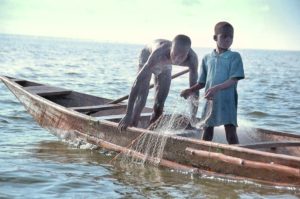Effective labour inspection needed to curtail child trafficking – NECPAD
 Mr Paul Asamoah Kukwaw, the Executive Director of Network for Community Planning and Development (NECPAD), has called for effective labour inspection to curtail child trafficking.
Mr Paul Asamoah Kukwaw, the Executive Director of Network for Community Planning and Development (NECPAD), has called for effective labour inspection to curtail child trafficking.
He called on the labour Department to go beyond inspecting only the formal sector institutions and to monitor the informal sector organisations, which were the major scene for child trafficking.
Mr Asamoah was speaking at a day’s workshop on Child labour organised in partnership with the Labour Department and NECPAD.
The workshop was on the theme “Sustainable Nets- Building a sustainable Protection Network to eliminate Child Labour as a result of Human Trafficking on the Volta Lake.”
The partners are implementing a 30-month interventions dubbed: ” The Sustainable Nets Project”, which seeks to contribute to the elimination of all worst forms of child labour, arising from human trafficking in the fishing sector of the country.
Mr Asamoah said, “Trafficking occurs in many areas, but largely in our economy, trafficking occurs in the informal sector and so that is the call for formalizing the informal sector, ” he said.
He, however, said that the entire informal sector could not be legalized because there were more threshold issues that needed to be addressed.
“More inspectors are needed in the labour Department to conduct series of inspections in the informal sector,” he added.
He urged government, through the Ministry of Employment and Labour Relations, to resource the labour Department with more trained and enlightened labour inspectors, who would go to the informal sector and conduct these labour inspections.
“This needs to be done because the Department complains of a limited number of staff, and we need to enhance their capacity, their numbers in order for them to do effective inspections,” he said.
“We are looking at building a network, eliminating child labour, which results from human trafficking and focusing on the volta lake. Even though we are focusing on the Volta Lake, we are also mindful of where these children are sourced from and their destination,” he stated.
The Executive Director emphasised that due to the prevalence of child labour among the informal sector such as cocoa, mining, and fishing, NECPAD had organised the project in six regions.
The Regions are Greater Accra, Oti, Volta, Western, Bono East, and the Central to provide interventions to aid in the eradication of child labor and trafficking.
He said NECPAD and its partners had created awareness about child labour, trafficking, and advocacy in 30 communities using community radios and information centres.
Mr Asamoah noted that one of the tangible things on the project had to do with what they called “sustainable livelihood scheme.”
He said they had identified over a hundred children who were into child labour or trafficking on the volta lake and had offered them the “sustainable livelihood scheme” to update themselves in a skill so they did not go back to the Lake.
“We provided them with counseling, reintegration and sent them to their families instead of putting them in shelters or feeding them, we decided to give them skills in apprenticeship and other vocational training,” he added.
He urged NGOs, who attempted to rescue victims of child labour and trafficking to desist from it as it was the sole responsibility of law enforcement agencies and social welfare.
He encouraged them to rather liaise with law enforcement agencies because there could be things that appeared as child trafficking, but they may not be one.
He said in the case of human trafficking, a conduct, means and goal had to be established, and it was the law enforcement agencies who could establish those facts.
He also encouraged them to take advantage of the impressive units within the Ghana police, and anti-human traffic of the Ministry of Gender and Children, and Social Protection to work together and bring perpetrators to book.
Source: GNA
